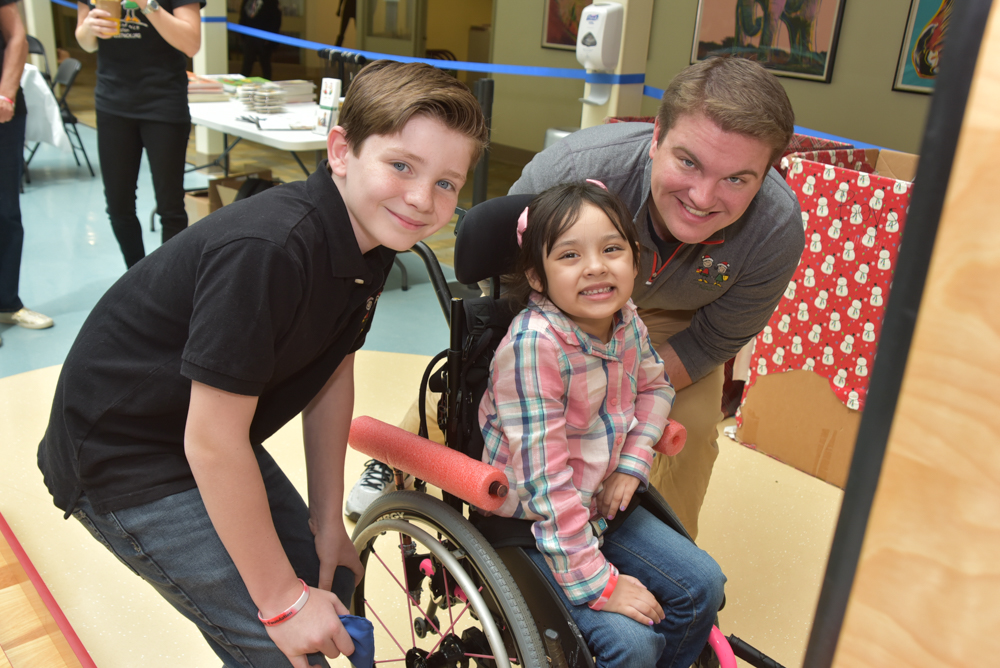Ray Mohler, Jr. knows what it is like to be a scared child in a hospital emergency room. As a 4-year-old, he woke up with pain in his hips and was taken straight to the hospital by his parents. He was treated and released later that day in 2002, but the traumatic experience and the fear he felt left a deep impression on him.
“I had no idea what was going on, my parents were freaking out,” Mohler says. “It was a very scary time, because they didn’t know what was wrong with me.”
When young Mohler learned that other little children didn’t always get to go home as soon as he did, he wanted to help make their hospital experience brighter. Later that year, he gave his Christmas presents to kids in the hospital, and he began collecting toys for sick children every year after that. Today, his efforts have grown into the Little Saint Nick Foundation, an organization that gets kids involved with serving other kids. Children of all ages volunteer with the charity, making gift bags, collecting toys, and throwing parties for hospitalized kids to make their stay easier and less stressful.
Mohler says the opportunity to serve has been life-changing for him and the children who volunteer with the Little Saint Nick Foundation.
“You can just tell that their moods get so much brighter when they come help with our organization,” he says.
Volunteering and serving others can have a profound impact on people and their emotional and physical well-being, whether they give service or receive it. Here are five ways service is beneficial to your health.
Service Gives Purpose, Raises Self-Esteem
Whether you get involved in an official organization or you go out of your way to help your neighbors, serving others can help raise your self-esteem and give you a sense of purpose. One study found that teens who volunteered and served people they didn’t know reported higher feelings of self-worth. The biggest key to the self-esteem boost was altruistically giving back.
Serving Others Can Reduce Stress
Helping others can help to reduce stress, both for the person giving service and the person receiving it. On the volunteer’s end, service gives a feeling of accomplishment and confidence that one’s actions have meaning. On the receiver’s end, service invokes feelings of gratitude.
According to Mohler, the goal of his organization is to reduce stress for hospitalized children, and he has seen first-hand the effect the service has on kids. The gift bags that children receive in the emergency room with crayons, get-well cards, and other fun treats help to distract them and ease their fears. And when children are at ease, that feeling spreads to their parents as well as the doctors and nurses who are trying to care for them.
“It takes their mind off what they’re going through,” Mohler says. “It really changes the whole vibe and the culture of the emergency department.”
Volunteering Can Help You Live Longer
Research suggests that people who serve others may live longer. People who see the most benefit are those who volunteer in order to help others, rather than those who serve due to an obligation or for their own benefit. In one study, researchers found that people who volunteer frequently and regularly had a lower risk of dying compared to people who do not volunteer.
The Little Saint Nick Foundation currently serves about 10,000 children each year working with hospitals in New York and Florida, where Mohler is now in school. Mohler says with corporate sponsors and individual donations, he hopes to bring the foundation’s services to children in hospitals across the country. Giving back to kids in hospitals has helped him gain a new perspective on life, he says, and he can see the transformation for kids who volunteer with the foundation as well.
Visit the Little St. Nick Foundation webpage for more information on the work this nonprofit does.


